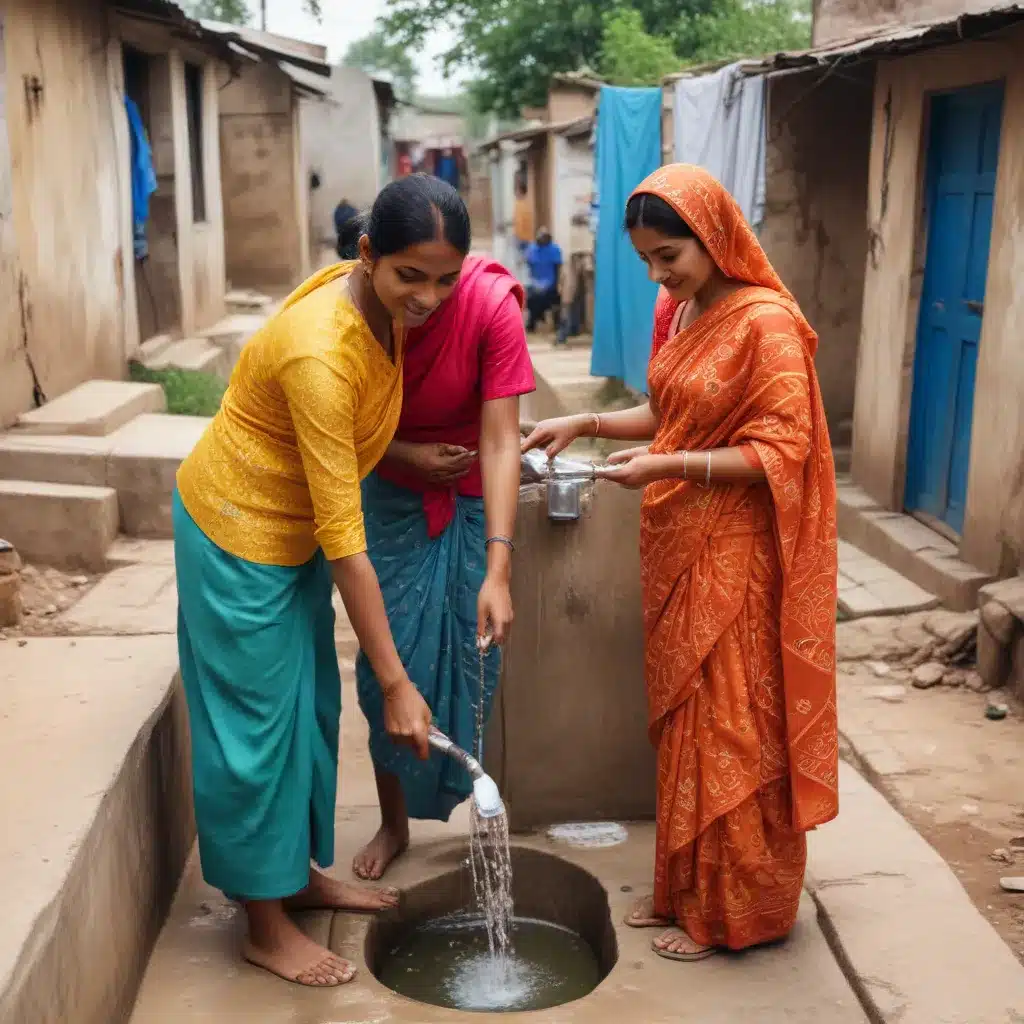
Unlocking the Potential of Informal Communities
In the rapidly growing city of Hyderabad, India, over 30% of the population lives in informal settlements lacking access to basic water, sanitation, and hygiene (WASH) services. These vibrant yet under-served communities hold immense potential to drive innovative solutions and entrepreneurship that can improve WASH access and affordability for all. By embracing the ingenuity of slum dwellers and supporting their enterprises, Hyderabad can foster a more inclusive, sustainable, and resilient future.
Leveraging Community-Led Initiatives
Across Hyderabad’s slums, resident-led organizations have demonstrated their ability to identify WASH challenges and implement contextual solutions. In the Bholakpur neighborhood, the community-based Slum Dwellers Association (SDA) worked with local government to upgrade water infrastructure, install community toilets, and organize waste collection services. The SDA’s participatory approach empowered residents to co-design interventions that fit their needs and local resources. Joint Action for Water has documented similar community-driven WASH initiatives in other Indian cities, showcasing how bottom-up innovation can transform service delivery.
Empowering Informal Entrepreneurs
Many slum dwellers in Hyderabad have also established small enterprises to address WASH gaps, filling critical service voids left by the formal sector. For example, informal water vendors provide affordable drinking water to households lacking piped supply, while waste pickers collect and recycle materials that municipal trucks often overlook. These entrepreneurs possess invaluable contextual knowledge and adaptability, yet frequently face harassment, limited access to financing, and precarious working conditions.
Unlocking the potential of informal WASH enterprises requires rethinking outdated perceptions and collaborating with these entrepreneurs as partners. Integrating them into municipal service contracts, providing business development support, and ensuring worker protections can catalyze a new wave of inclusive WASH innovation. UN-Habitat’s report on housing and the SDGs highlights how such approaches can empower marginalized communities while improving citywide service delivery.
Fostering a Culture of Innovation
To further drive WASH progress in Hyderabad’s informal settlements, the city must cultivate an enabling environment for grassroots innovation and entrepreneurship. This means establishing innovation funds, business incubators, and maker spaces dedicated to affordable WASH solutions. The World Resources Report on urban transformations showcases how cities can leverage these tools to unlock the creativity of under-served communities.
Hyderabad can also draw inspiration from other Indian cities pioneering inclusive WASH innovation. In Pune, the Informal Workers Coordinating Committee partners with the municipality to co-create worker-driven waste management models. And in Ahmedabad, the Mahila Housing SEWA Trust has empowered low-income women to access solar energy, improve home sanitation, and start small WASH businesses. By adapting such community-centric approaches, Hyderabad can position its informal settlements as hubs of sustainable WASH transformation.
Aligning WASH Innovation with Broader Development Goals
Beyond meeting immediate service gaps, supporting WASH innovation in Hyderabad’s informal communities can advance the city’s progress toward the Sustainable Development Goals (SDGs). Specifically, these efforts can:
-
Reduce Inequalities (SDG 10): Ensuring marginalized residents have affordable access to WASH services is fundamental to addressing urban inequities. Community-driven solutions can democratize innovation, challenging the notion that technological progress only benefits the wealthy.
-
Build Sustainable Cities and Communities (SDG 11): Slum-based WASH enterprises can enhance the resilience and environmental sustainability of Hyderabad’s urban systems. For instance, waste picker cooperatives divert recyclables from landfills, while decentralized water treatment plants reduce energy-intensive centralized infrastructure.
-
Promote Decent Work and Economic Growth (SDG 8): Supporting informal WASH entrepreneurs provides stable livelihoods, expands the local green economy, and nurtures the innovative spirit of slum communities. This aligns with the city’s broader goal of inclusive, sustainable prosperity.
-
Ensure Good Health and Well-Being (SDG 3): Improved WASH access directly benefits public health, reducing the spread of waterborne diseases and improving hygiene practices. Community-led initiatives can tailor interventions to local needs and behaviors, maximizing health impacts.
To fully leverage these synergies, Hyderabad must adopt a holistic, cross-sectoral approach to supporting WASH innovation in informal settlements. This requires aligning initiatives with the city’s wider development agenda, securing sustainable financing, and elevating the voices of slum dwellers in policy decisions.
Building Partnerships for Transformative Change
Realizing Hyderabad’s vision of affordable, accessible WASH services will necessitate collaboration among diverse stakeholders. Key actions include:
Engaging Slum Communities as Co-Creators
Empower resident-led organizations to co-design, implement, and monitor WASH interventions. Facilitate their participation in municipal planning processes, and provide capacity-building support to strengthen community leadership.
Supporting Informal WASH Enterprises
Integrate informal water vendors, waste pickers, and other WASH entrepreneurs into the formal service delivery system. Offer access to affordable financing, business development training, and social protection to enhance their productivity and resilience.
Strengthening City-Community Partnerships
Foster sustained dialogue and joint problem-solving between municipal authorities, community groups, and NGOs. Establish collaborative platforms to collectively identify challenges, co-create solutions, and advocate for policy change.
Mobilizing Diverse Funding Streams
Blend public, private, and community-driven financing to fund WASH innovations. Leverage municipal budgets, impact investment funds, and crowdsourcing platforms to resource grassroots initiatives and scale up promising models.
Improving Data and Knowledge Sharing
Strengthen the evidence base on informal WASH practices, their socioeconomic and environmental impacts, and effective scaling strategies. Facilitate cross-city learning and knowledge exchange to accelerate the dissemination of innovative solutions.
Conclusion: Unlocking the Power of Inclusive Innovation
Hyderabad’s informal settlements harbor immense untapped potential to drive sustainable WASH solutions. By empowering community-based organizations, nurturing informal WASH enterprises, and aligning these efforts with the city’s broader development goals, Hyderabad can chart a more equitable and resilient path forward.
Through innovative partnerships, inclusive financing, and knowledge sharing, the city can unlock the innovative spirit of its most marginalized residents, positioning them as active agents of change. This transformative approach can not only improve WASH access but also foster sustainable livelihoods, strengthen community resilience, and advance Hyderabad’s sustainable development aspirations. The time is now to embrace the power of grassroots innovation and entrepreneurship for a more inclusive and prosperous future.

